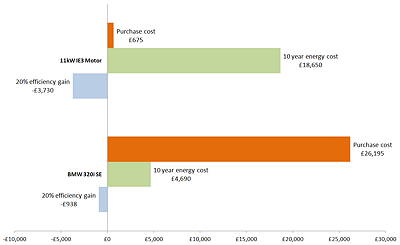You worry about mpg, so why not p/kWh?
When buying a motor-driven system, it is much more important to consider its running costs than its purchase price. Gambica’s* deputy director, Steve Brambley, draws a striking analogy with buying a car.
In this article, I want to illustrate exactly why it is so important to assess the energy cost of a motor-driven system, rather than getting stuck at the purchase cost stage. To compare purchase prices only is a false economy and overlooks the considerable financial benefit of lower lifetime costs. Any capital saved by not investing in the most efficient motor and control system can be lost many, many times over in the additional energy consumed by the system during its operating life.
Whether it is being used for pumps, fans, compressors, conveyors, ventilation, refrigeration, fluid handling or cooling, the energy cost of a motor-driven system will be significant compared to its purchase cost. However, while the capital budget often gets a lot of scrutiny, and purchase cost is a major factor in the decision process, the energy cost of a system is rarely quoted or requested.
When you buy a new car, the fuel consumption figures are quoted on advertisements and promotional literature and, in many cases, are used as a marketing tool to help sell the car. Taking a typical saloon car, the fuel cost over ten years would amount to only about 20% of the original purchase cost, even though many owners wouldn’t keep the car that long. The initial purchase is an important factor, yet miles-per-gallon are still taken into account.
In the case of a typical electric motor, the energy cost over ten years is more than 25 times the purchase cost, and many businesses will keep the system operating a lot longer than that. You would think that the efficiency of the system would be the primary concern in this case.

The comparison is illustrated in the graph (above), where it becomes very obvious that energy efficiency should be the major decision factor when buying a motor-driven system.
If the motor-driven system could be made 20% more efficient, then it would save more than five times its purchase cost in energy. In many systems, intelligent motor control can be used to vary the motor’s speed or switch it off when it is not needed to save this 20% or more. Any investment in saving energy in such a system will usually pay back quickly and continue to make savings throughout the life of the motor.
By comparison, a 20% fuel economy in a car is rarely a realistic option, but even where it is possible, it is only going to save 4% of the purchase price.
Anyone who buys or uses electric motors should always pay attention to their energy consumption, as it will outweigh the purchase cost several times over. You should be asking yourself:
• Is there a more efficient motor that will use less energy?
• Can the motor be controlled by a VSD or automated starter to reduce the energy consumption?
• Has the whole system been designed to optimise energy efficiency?
The significant energy consumption of a motor compared to the purchase price means that any way of improving the efficiency can repay the investment many times over. This applies equally to installed motors and to new purchases. Many of the systems already operating in industry and business would benefit from retrofitting some form of control system to reduce energy consumption.
Don’t just ask how much it costs to buy, but how much it costs to run – and how much could I save?
* Gambica is the trade association for the automation, control, instrumentation and laboratory technology sectors in the UK.





